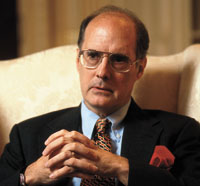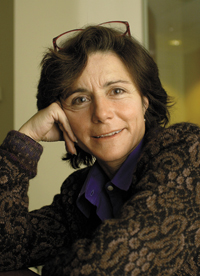
Brooke Shearer |
for Study of Globalization
Strobe Talbott, the deputy secretary of state and a key architect of U.S. foreign policy for the past eight years, will direct the new Yale Center for the Study of Globalization.
The University will also launch an innovative fellowship program for emerging leaders of other countries and establish the first of three new interdisciplinary professorships in international studies.
The announcements underscore the determination of Yale, which celebrates its 300th birthday in 2001, to become a thoroughly global institution of higher education as it enters its fourth century. (See related story.)
Talbott, a 1968 graduate of Yale College and a former trustee of the University, will begin work in July 2001 as director of the new center and professor in the field of international relations.
"Strobe Talbott's contributions to international relations have spanned the worlds of scholarship, journalism and diplomacy," President Richard C. Levin said. "He is superbly qualified to direct an effort that will draw on Yale's distinguished faculty to understand globalization, promote on-line dialogue about its implications, and facilitate the resolution of global and regional conflicts."
Talbott became deputy secretary of state in early 1994 after serving for a year as ambassador-at-large and special adviser to the secretary of state on the new independent states. He entered public service after 21 years as an award-winning journalist for Time magazine, where he was editor-at-large, foreign affairs columnist, Washington bureau chief, State Department correspondent and White House correspondent.
A Rhodes scholar, Talbott is the translator and editor of Nikita Khrushchev's memoirs and the author of six books on diplomacy and U.S.-Soviet relations. Since becoming deputy secretary, he has written articles for The New York Times, The Washington Post, The Economist, The Financial Times, Foreign Affairs, Foreign Policy, The New York Review of Books, The Wall Street Journal, World Policy Journal and Slate.
Talbott has served as a director of the Council on Foreign Relations and the Carnegie Endowment for International Peace, a trustee of the Trilateral Commission and a member of the Aspen Strategy Group.
"In moving from government to Yale, I'm coming home to a community that has always upheld the highest intellectual standards while actively engaging in the affairs of the world," said Talbott. "That tradition makes Yale a natural leader in the quest to understand, explain and shape the forces that are changing our lives and defining our era. The mission of the center is to help the University meet that challenge."
The Center for the Study of Globalization and the fellowship program for emerging global leaders will be housed in the Davies Mansion, a recently restored Victorian mansion of nearly 20,000 square feet that sits on a hilltop at the north end of the Yale campus.
Details of each initiative follow.
The center will serve as a catalyst for research, writing, and teaching on globalization, utilizing Yale faculty and bringing to Yale distinguished scholars and practitioners of international affairs. Initial funding for the center has been provided by a generous grant from the William and Flora Hewlett Foundation and a gift from an individual donor.
The center will also engage in "Track II diplomacy" -- privately sponsored efforts to promote dialogue between opposing sides in crises and disputes. The center will conduct Track II projects drawing on University faculty and the center's visitors for expertise on the ethnic, national, religious, cultural and economic issues that underlie regional conflicts.
Recognizing the Internet's status as an engine of globalization, the center will develop a premier website on all dimensions of the subject. The website will host an on-line journal of opinion for scholars and practitioners. Along with the center's teleconferencing facility, the website will carry the proceedings of the center's conferences and seminars; it will publish articles and papers produced by Yale scholars and visitors and establish links among institutions and individuals working on globalization worldwide.
Among leading scholars of globalization at Yale are historians John Gaddis and Paul Kennedy; political scientists Geoffrey Garrett, Bruce Russett and James Scott; economists William Nordhaus, T.N. Srinivasan, and Gustav Ranis, who is director of the Yale Center for International and Area Studies; Law School professors Paul Gewirtz and Harold Koh; James G. Speth and Daniel C. Esty, dean and deputy dean respectively of the School of Forestry and Environmental Studies; public health experts Ilona Kickbusch and Michael Merson; and Jeffrey Garten, dean of the Yale School of Management.
To extend Yale's traditional mission of educating future leaders in all fields of human endeavor, the University will inaugurate a new program, sponsored by the Office of the President, to bring to campus promising young leaders from around the world for an intense one-semester period of study focused on global problems.
Candidates for the program will come from government, law, and business, as well as academe, religious bodies and non-governmental organizations on every continent. The fellows would be several years beyond the completion of their formal education and would have distinguished themselves in their fields.
The executive director of the Yale World Fellows Program will be Brooke Shearer, who currently conducts international programs for the U.S. National Park Service, and the faculty supervisor for the program will be Daniel C. Esty, deputy dean of the School of Forestry and Environmental Studies (F&ES), who heads Yale's Center for Environmental Law and Policy;
Shearer was director of the President's Commission on White House Fellowships from 1993 to 1997. She administered all aspects of the prestigious non-partisan program, implemented an outreach campaign that greatly diversified the applicant pool and expanded fundraising for the fellowships to its highest level ever. Shearer has worked at the Interior Department since 1997, initiating and conducting projects to help emerging nations develop cultural-heritage sites and national parks.
"I am excited at the prospect of helping Yale add a new dimension to its education of global leaders," Shearer said. "The program will sharpen the fellows' skills, broaden their perspectives, and enhance their abilities to shape their lives and the future of their counties."
Esty, an expert on the relationship between environmental issues and international trade policy, served in the Environmental Protection Agency as its deputy assistant and administrator for policy, deputy chief of staff, and special assistant to Administrator William Reilly. At the EPA, he negotiated the environmental provisions of the North American Free Trade Agreement, the 1990 amendments to the Montreal Protocol and 1992 Climate Change Convention.
Esty said, "I am so pleased to be part of Yale's expanding globalization efforts. The World Fellows Program positions Yale to play an important role in understanding the problems that arise at the global-scale and in building the personal relationships and networks needed to manage interdependence."
To support Yale's expanded commitment to international students and programs, Levin announced the creation of three new senior professorships in international studies. Yale already has established the first; Levin will seek donor support to endow the remaining two.
The University allocated the new positions to the Yale Center for International and Area Studies (YCIAS), which will seek to identify scholars whose interests span the work of at least two of Yale's academic departments or professional schools.
"The solutions to many of our most important global problems require knowledge that spans two or more disciplines, yet academic departments tend to favor specialists," Levin said. "The University's excellence in international studies will be enhanced by the addition of these special positions, designed to attract scholars and teachers who can make interdisciplinary contributions to our understanding."
YCIAS, directed by Gustav Ranis, oversees Yale's nine area studies councils, the master's program in international relations, undergraduate majors in international studies and ethnicity, race and migration, as well as numerous research and teaching programs including the Academic Council on the United Nations System, Genocide Studies, Agrarian Studies, the Leitner Program in International Political Economy, the European Union Studies Program, and the Gilder Lehrman Center for the Study of Slavery, Resistance, and Abolition.
T H I S
Bulletin Home
The Yale Center for the Study of Globalization
The World Fellows Program
Interdisciplinary professorships in international studies
 W E E K ' S
W E E K ' S S T O R I E S
S T O R I E S![]()
 Strobe Talbott to head Center for Study of Globalization
Strobe Talbott to head Center for Study of Globalization![]()
![]()
 Need-blind admission policy extended to international students
Need-blind admission policy extended to international students![]()
![]()
 Project boosts interdisciplinary debate about bioethical issues
Project boosts interdisciplinary debate about bioethical issues![]()
![]()
 Arts Council honors six Yale affiliates
Arts Council honors six Yale affiliates![]()
![]()
 ENDOWED PROFESSORSHIPS
ENDOWED PROFESSORSHIPS Fiona M. Scott Morton is appointed the James L. Frank Associate Professor
Fiona M. Scott Morton is appointed the James L. Frank Associate Professor![]()
 Jeffrey Wurgler is the new Haas Assistant Professor of Corporate Finance
Jeffrey Wurgler is the new Haas Assistant Professor of Corporate Finance![]()
![]()
 Yale astronomers to collaborate with Chilean university
Yale astronomers to collaborate with Chilean university![]()
![]()
 India enjoying 'moment of pride and promise,' says former leader
India enjoying 'moment of pride and promise,' says former leader![]()
![]()
 Pediatrician's achievements saluted at event in his honor
Pediatrician's achievements saluted at event in his honor![]()
![]()
 Lawyer takes hellish journey to 'Heaven' in next Yale Rep show
Lawyer takes hellish journey to 'Heaven' in next Yale Rep show![]()
![]()
 A Material World: Backstage at the Costume Shop
A Material World: Backstage at the Costume Shop![]()
![]()
 Philosopher Shelly Kagan is reappointed Luce Professor
Philosopher Shelly Kagan is reappointed Luce Professor![]()
![]()
 Student shares his travels in China via video 'journal'
Student shares his travels in China via video 'journal'![]()
![]()
 Talking and Teaching: Bill Cosby and Roland Clement
Talking and Teaching: Bill Cosby and Roland Clement![]()
![]()
 Long-time faculty member Irvin L. Child, a noted psychologist, dies
Long-time faculty member Irvin L. Child, a noted psychologist, dies![]()
![]()
 Camerata's annual Advent concert will feature work by Yale composers
Camerata's annual Advent concert will feature work by Yale composers![]()
![]()
 Talk to explore how election impacted the business world
Talk to explore how election impacted the business world![]()
![]()
 Campus Notes
Campus Notes![]()
![]()
 In the News
In the News![]()
![]()
 Yale Scoreboard
Yale Scoreboard![]()
 |
| Visiting on Campus
Visiting on Campus |
| Calendar of Events
Calendar of Events |
| Bulletin Board
Bulletin Board![]()
Classified Ads |
| Search Archives
Search Archives |
| Production Schedule
Production Schedule |
| Bulletin Staff
Bulletin Staff![]()
Public Affairs Home |
| News Releases
News Releases |
| E-Mail Us
E-Mail Us |
| Yale Home Page
Yale Home Page
